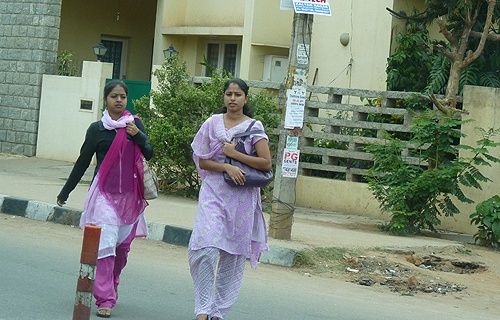
.- A researcher at Washington D.C.’s Georgetown University has found that impoverished women in India are more likely to improve their economic circumstances after converting to Christianity.“Conversion actually helps launch women on a virtuous circle. A woman feels better, she’s part of an active faith community, she works more, she earns more money: the extra money she earns and saves encourages her to earn more and save more and plan and invest in the future,” said Rebecca Samuel Shah, research fellow at Georgetown’s Berkley Center for Religion, Peace, and World Affairs.
Shah presented her initial findings of a pilot study looking at “patterns and directions where conversion had an impact” on Dalit women in Bangalore, India at a conference on “Christianity and Freedom” held in Rome on Dec. 13-14. Shah and her team studied 300 women who lived in a Dalit slum community over the course of 3 years. When they began their research, they did not know that 23 percent of the women being interviewed were actually converts to Christianity. Dalits are considered the “outcasts” of or “pariahs” of society in India.
“One is actually born a Dalit, you cannot leave a Dalit status. You’re born and you live and you die a Dalit,” Shah explained. “Dalits are employed in the some of the worst jobs…they scavenge, they sweep, they’re tanners. They do the smelliest, dirtiest work, and therefore they ‘polute’… they’re ‘untouchables.’”
Moreover, “Dalits are not allowed to go near a (Hindu) temple, or touch a religious object that is used in worship.”
Because “they don’t want to live on the margins” of society, “they are converting to Christianity,” she noted.
Shah’s study yielded some surprising results about the impact of Christian conversion on the lives of Dalit women in “a very violent urban slum.”
The majority of Hindu, Muslim and Christian Dalit women interviewed were illiterate. Many belong to a microfinance program which gives them access to loans which they then use towards their children’s education or to run a small business.
The first “unexpected pattern” Shah encountered was in housing. “The converts converted their loans to purchasing houses, and turned dead capital into resources to generate additional capital.”
Housing is an exceptionally important issue because “these people live in a slum community. It’s a transient community, they’re originally migrant workers, they had de facto rights to the property, but did not have legally enforceable title,” said Shah.
The impact of home ownership is crucial, since “by being able to own a house, these poor women were able to get bank loans, commercial loans, which they didn’t have access to before that. When you have a house you can get a loan at 3 percent, instead of from a money lender at 18 percent. So having a house is a very important investment in your future, so you can have access to very affordable credit.”
The second “dramatic” finding in Shah’s study concerned domestic violence.
A national family health survey in India in 2005-2006 indicated that 86 percent of the women interviewed nationally had never told anyone that they had been abused.
According to Shah, this large scale study indicated that a woman’s religion was an important indicator of whether or not she would seek help. “Only 24 percent of Hindu women sought help, and 22 percent of Muslim women, but 32 percent of Christian women sought help,” she noted.
Shah’s own study “echoed” the national health data, in that “57 percent of women – a very large number of women – actually tell their pastor” about domestic violence.
She pointed to two key factors in the higher reporting of abuse. “These women are very closely involved, very actively involved, in their faith community. When they arrive in their weekly prayer meetings and they’ve got a gash across their face, or they’re lacking a few teeth, they get noticed.”
Furthermore, “pastors that are usually male visit the homes, and they repeatedly visit the homes, so at some point, the husband who’s beating up his wife is shamed into stopping beating his wife.”
This indicates a “very interesting connection” between home ownership and seeking help for domestic abuse, “because many of those women literally open the doors and bring their pastors into this very violent and very dark situation of their homes.”
“It was a unique finding. We were not looking for this,” added Shah.
The Georgetown researcher then pointed to the underlying factors that accompany an improvement in circumstances after conversion.
“Conversion activates in the converts a powerful new concept of value and initiative,” she explained.
It offers “a radically different way of seeing themselves: seeing themselves as a new creation, a new identity, made in the image of God, seeking a better life for themselves.”
“Poverty is inherently depressing. It’s discouraging. It’s debilitating. It breeds hopelessness: ‘why bother?’” she reflected.
Yet with a new Christian vision, “The future is not terrifying. It can be achieved. Because God is with them, they can invest in the future. It’s not something to ignore, not something to be terrified of.”
Moreover, through the combination of a new sense of identity and access to credit in microfinance, “the converts may harness their agency and capability into investing in the future to improve their lives.”
Conversion, then, first “changes who they believe themselves to be, it changes their self-conception, their belief in who they are, and secondly, it changes how they can change their family’s future and themselves.”



